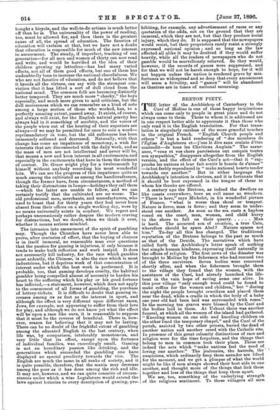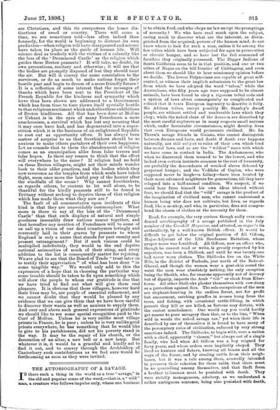BRETON PIETY. T HE letter of the Archbishop of Canterbury to
the Cure of Molene is one of those happy inspirations which can come only to people in great place and do not always come to them. Those to whom it is addressed are in one respect better able to appreciate it than those who only read it in the English translation. For that trans- lation is singularly careless of the more graceful touches in the original French. "English Church people and others " is but a bald rendering of " des membres de l'Eglise d'Angleterre et—j'ose le dire sans crainte d'etre contredit—de tons les Chretiens Anglais." The assur- ance, " vous et vos chers paroissiens ont conquis toutes nos sympathies," disappears altogether from the English version, and the effect of the Cure's act—that it " rap- proche les nations et leur fait sentir le besoin de s'aimer" —is but feebly reproduced in " make national hearts tender towards one another." But in either language the Archbishop's intention is obvious, and it is fortunate that it should be best expressed in the tongue of those to whom his thanks are offered.
A century ago the Bretons, as indeed the dwellers on like coasts everywhere, bore an evil name as wreckers. " There is here," says Michelet, in his wonderful picture of France, "what is worse than shoal or tempest. Nature is fierce, man is fierce ; and they seem to under- stand one another. As soon as the sea casts a hapless vessel on the coast, man, woman, and child hurry to the shore to fall on their quarry Man is hard. The accursed son of creation, a true Cain, wherefore should he spare Abel ? Nature spares not him." To-day all this has changed. The traditional reputation of the Bretons belongs to the past as much as that of the Druids. The narratives which have called forth the Archbishop's letter speak of nothing but simple human kindness, expressing itself naturally in the offices of religion. The first news of the disaster was brought to Molene by the fishermen who had rescued two of the three survivors. Seven bodies were recovered shortly after, and when the fishermen brought them to the village they found that the women, with the assistance of the Cure, had already launched the life- boat in the vain hope of saving some one alive. In this poor village " only enough wood could be found to make coffins for the women and children," but " during the night the people brought crucifixes and placed them near the dead, while a cradle in which the body of a baby one year old had been laid was surrounded with roses." In the morning ten graves were blessed by the Cure, and the bodies laid in them. At Ushaut there was another funeral, at which all the women of the island had gathered. " Kneeling women on one side and kneeling children on the other lined the temporary chapel," and the Cure of the parish, assisted by two other priests, buried the dead of another nation and another creed with the Catholic rite. In presence of this great calamity distinctions of race and religion were for the time forgotten, and the things that belong to men in common took their place. These are indeed the acts which "make nations feel the need of loving one another." The jealousies, the hatreds, the' suspicions, which ordinarily keep them asunder are lifted for the moment, and we get a glimpse of what the world might be like if men always showed their best side to one another, and thought more of the things that link them together and less of the things that keep them apart. We see, too, something of the underlying strength of the religious sentiment. To these villagers all men are Christians, and this tie overpowers the lesser dis- tinctions of creed or country. There will come a time, we are sometimes told—less often indeed than formerly, for the world is beginning to distrust its own prediction—when religion will have disappeared and science have taken its place as the guide of human life. Will science deal as tenderly with the victims of a calamity like the loss of the Drummond Castle' as the religion which guides these Breton peasants ? It will take, no doubt, its own precautions, sanitary and otherwise ; it will see that the bodies are promptly disposed of lest they should taint the air. But will it convey the same consolation to the survivors, or do as much to make nations forget their hostile past and begin to dream of a more friendly future ? It is a reflection of some interest that the messages of thanks which have been sent to the President of the French Republic for the kindness and sympathy which have thus been shown are addressed to a Government which has from time to time shown itself specially hostile to that religious sentiment which underlies these exhibitions of Breton kindliness. All that has been done at Molene or Ushant is in the eyes of many Frenchmen a mere anachronism, a. survival which has lost any meaning that it may once have had, and has degenerated into a super- stition which it is the business of an enlightened Republic to root out as opportunity offers. It has always been matter of surprise to us that freethinkers should be so anxious to make others partakers of their own happiness. Let us concede that to them the abandonment of religion comes as an emancipation alike from false terrors and false hopes. Is there any reason to think that the effect will everywhere be the same ? If religion had no hold on these Breton villagers, might not their minds wander back to their older practices, and the bodies which they now reverence as the temples from which souls have taken flight, seem once more the lawful prey of the hunter after the windfalls of the ocean I' Why cannot freethinkers, as regards others, be content to let well alone, to be thankful for the kindly peasants still to be found in Brittany without seeking to deprive them of that religion which has made them what they now are ? The fault of all commentaries upon incidents of this kind is that they are unavoidably commonplace. What more is there to say of the loss of the Drummond Castle' than that such displays of natural and simple goodness insensibly draw nations nearer together, and that hereafter any mention of Frenchmen will to some of us call up a vision of our dead countrymen lovingly and reverently laid in their graves by peasants to whom England is only a name that stands for past enmity and present estrangement ? But if such visions could be multiplied indefinitely, they would in the end deprive national animosities of much of their sting, and every addition to the list is consequently matter for rejoicing. We are glad to see that the Board of Trade " trust later on to testify their appreciation " of what has been done " in some tangible way." We would only add to this the expression of a hope that in choosing the particular way some trouble should be taken to fix upon something which will show the people to whom our gratitude is due that we have tried to find out what will give them real pleasure. It is obvious that these villagers, however hard their lives may be, are people of essential refinement, and we cannot doubt that they would be pleased by any evidence that we can give them that we have been careful to discover their wants as well as anxious to supply them. And over and above such general expressions of gratitude we should like to see some special recognition paid to the Cali of Molene. Unless he is very unlike most village priests in France, he is poor; unless he is very unlike good priests everywhere, he has something that he would like to give to hiis parishioners, did not his poverty stand in the way. It may be the repair of his church, or the decoration of an altar, a new bell or a new lamp. But whatever it is, it would be a graceful and kindly act to find it out, and to convey through the Archbishop of Canterbury such contributions as we feel sure would be forthcoming as soon as they were invited.

















































 Previous page
Previous page